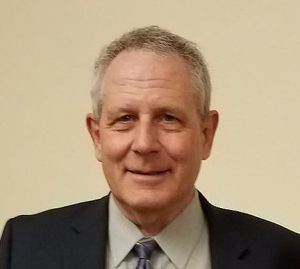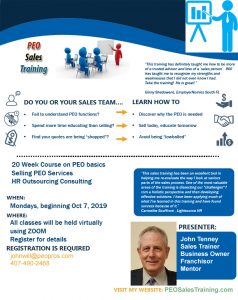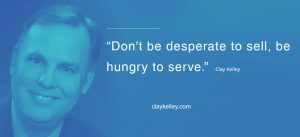 Can Sales be Ethical?
Can Sales be Ethical?
We at PEO Sales Training believe that all sales must abide by certain rules of ethics. We teach Ethical Selling. PEO business, like many others, requires long term thinking. The best clients are those that stay with you for many, many years. Some reports indicate that the cost of the sale for a typical client is not recuperated until the client is with the PEO for at least a year.
First let’s start with some guidelines. In an ethical sales transaction there is:
- Transparency
- Integrity
- Accuracy
- Reliability
- Accountability
- Open Communication
- Full Disclosure
What’s not in an ethical sale:
- Deception
- Hidden Charges
- Hidden Defects
- Unnecessary Up-Selling
- Denigrating the Competition
- Pressure Tactics
- Traps, Baits or Hooks
Two Way Street
Of course, the ethics need to be followed on both sides. We know that prospects have a tendency to lie to salespeople. Well they can’t be blamed for that. They believe if they tell the truth it will be used against them by an unethical sales person.
Therefore, the goal is to develop an open, trusting relationship as soon as possible. If the prospect believes you are really interested in the problem, and not just trying to make a sale, they will begin to open up to you and tell you the real story.

Ethical Sales is more of being a travel agent than a salesman. You help people go from point A to point B. Which do you think they have the most trouble describing? Not point B. Most people know, and have no trouble sharing, where they want to be. It’s only after trust is developed that they share where they really are, and what problems they really have.” Sales Trainer John Will Tenney
Tips To Avoid Ethical Traps
You Can’t Handle 100% of the Market
If you suddenly got 100% of your market, what would you do with it? Would you have the capabilities to handle it? Do you know anyone who could answer “yes” to that question?
You won’t get them all. Accept that now and also realize that you are not the best match for everyone either. In a sales meeting both sides should be qualifying the other, and disqualifying as well. It is perfectly acceptable to tell a prospect: “What I’m hearing is that we are not a good fit for you. May I suggest you contact (put in alternate source here.)”
Don’t “Bad Mouth” the Competition
While it’s true there are companies in our (indeed every) field that don’t do a good job, aren’t completely honest, or are very risky to work with. It’s not your job to tell people that. You are tasked with finding out if you are a match. Of course, you can ask questions. When presented with a low ball quote from one of those companies, for example, you might ask: “That’s a great quote. There must be some reason you haven’t taken it. May I ask your thinking on that?”
Failure is an Option
As previously stated, you will not win them all. However even the worst failure can be an educational experience. There are four acceptable outcomes to a sales meeting: Yes, No, Clear Future, and Lesson Learned. More is learned from failures than successes. Do not be afraid to fail.
Avoid Commission Breath
Few things make a prospect more uncomfortable than a hungry salesperson. It helps to remember that in this industry, closing a bad one has no long term gain. If it isn’t the right fit, the client will leave and the commission ends. Even worse, the reputation of the firm is in jeopardy, for taking the wrong client. Sure, they might leave in a friendly manner but are the chances of a good reference better, or worse?
Under Promise and Over Deliver
How often do you see the opposite? Don’t make promises you can’t keep. It will hurt you in the long run, and sometimes in the short run. So many firms have bad reputations in the industry for breaking this rule. Don’t be part of that.
Communicate
Pick up the phone. Write the email. Let the prospect or client know what is going on. Encourage the same from them. Lack of communication leads to lack of understanding, which can lead to all kinds of ugly situations.
Don’t Upsell Products They Don’t Need
Remember that as a PEO salesperson your job is to build a long term, profitable relationship on both sides. Selling products or services they don’t need is not going to help. There is always a lot of pressure to do this, but think of the ramifications of overloading a client with extra expenses for unused products or services. It can lead to loss of the residual income, which is why you got in this business in the first place.
Keeping It All Together
It’s important to audit yourself now and then and make sure you are following your own set of ethics. It helps to have it written down. Most CRM systems allow you to make notes on each client. Journal it. Score yourself on a scale of some sort, even if it’s 1 to 10. How ethical are you? Do the prospects and clients trust you? Are they comfortable referring you? Have you asked them?
If you would like more information on this article, please use the following form:
[caldera_form id=”CF5ae5d03da7ee0″]















